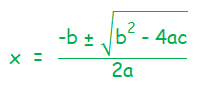FIND MISSING VALUE IN A QUADRATIC FUNCTION USING NATURE OF ROOTS
Subscribe to our ▶️ YouTube channel 🔴 for the latest videos, updates, and tips.
We can find the roots of the quadratic equation
ax2 +bx +c = 0 , a ≠ 0
using the quadratic formula

Here, b2 - 4ac called as the discriminant (which is denoted by D) of the quadratic equation, decides the nature of roots as follows
|
Value of discriminant Δ = b2 - 4ac Δ > 0 Δ = 0 Δ < 0 |
Nature of roots Real and unequal roots Real and equal roots No real roots |
Problem :
Find the value(s) of ‘k’ for which the roots of the following equations are real and equal.
(i) (5k −6)x2 + 2kx + 1 = 0
Solution :
By comparing the given quadratic equation with the general form of quadratic equation.
ax2 + bx + c = 0
a = 5k-6, b = 2k and c = 1
If the roots are real and equal, then Δ = 0
Δ = b2 - 4ac
(2k)2 - 4(5k-6)1 = 0
4k2 - 20k + 24 = 0
k2 - 5k + 6 = 0
k2 - 2k - 3k + 6 = 0
k(k - 2) - 3(k - 2) = 0
(k - 3)(k - 2) = 0
k - 3 = 0, k - 2 = 0
k = 3, k = 2
So, the values of k are 2 or 3.
(ii) kx2 +(6k + 2)x + 16 = 0
a = k, b = 6k + 2 and c = 16
If the roots are real and equal, then Δ = 0
Δ = b2 - 4ac
(6k + 2)2 - 4(k)(16) = 0
(6k)2 + 2(6k)(2) + 22 - 64k = 0
36k2 + 24k + 4 - 64k = 0
36k2 - 40k + 4 = 0
Divide by 4, we get
9k2 - 10k + 1 = 0
9k2 - 9k - k + 1 = 0
9k(k - 1) - 1(k - 1) = 0
(9k - 1) (k - 1) = 0
9k - 1 = 0, k - 1 = 0
k = 1/9 or k = 1
So, the values of k are 1/9 or 1.

To know more about nature of the roots of a quadratic equation,
Subscribe to our ▶️ YouTube channel 🔴 for the latest videos, updates, and tips.
Kindly mail your feedback to v4formath@gmail.com
We always appreciate your feedback.
About Us | Contact Us | Privacy Policy
©All rights reserved. onlinemath4all.com

Recent Articles
-
10 Hard SAT Math Questions (Part - 40)
Dec 25, 25 08:30 AM
10 Hard SAT Math Questions (Part - 40) -
10 Hard SAT Math Questions (Part - 41)
Dec 24, 25 07:58 PM
10 Hard SAT Math Questions (Part - 41) -
ASTC Formula in Trigonometry
Dec 23, 25 11:34 PM
ASTC Formula in Trigonometry - Concepts - Examples and Solved Problems


